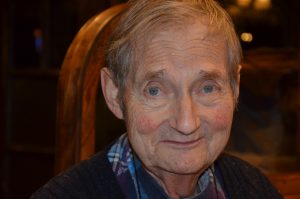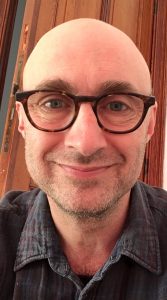Eulogy for Chaim Neslen
Chaim Neslen, beloved husband Diana Neslen and father of Arthur and Esther Neslen, recently passed away. Chaim was one of the nicest, most decent people you could meet. He was not a joiner of organisations, but he was with us in spirit. Diana, Arthur and Esther are all signatories. Diana is a lobby group member and former executive member. We print the eulogy to Chaim delivered by Arthur.

Chaim Neslen
My dad’s wonderful life touched so many people, so deeply, and in so many ways, that its difficult to count all the ripples. But you can see them in the eulogies that have spontaneously pored out – in emails, on facebook, in writing and in conversations. It’s never easy to offer condolences but the words chosen invariably say something about the life being appraised and the loss being mourned.
In Dad’s case, messages came from people he spoke yiddish with at Vy and Johns residential care home, or the Frinde Frum Yidish. Some were from concert goers who loved his immense repertoire of yiddish songs. “I’m only giving you back what was already yours,” he would tell them.
Plaudits came from the left and the right of the Jewish community, and from outside it. Relative strangers he had helped, students he taught in Oxford, activists who knew him from campaigns against racism, or the occupation. Many messages have come from Palestinians, and this would be a source of pride to Chaim. People have said:
“He was one of the kindest, gentlest souls I have met.”
“Last night we paid tribute to an old Bundist friend – Chaim Neslen – who died only days ago. We hope to uphold the traditions that Chaim and others built.”
“I didn’t see him very often of late but his presence in the world made my life better, and I’ll miss him.”
His presence has now left us. But every morning, the starlings, robins and pigeons still flock to our garden waiting for him to scatter the morning birdseed. All day, Cleo – his adored dog – still sits at the window waiting for him to come home. When I took her for a walk yesterday, I was surrounded by dogs, barking for snacks. I was confused until Jenny, a local dog owner, told me that he always brought extra dog treats to give them. He was simply “the man with the biscuits,” she said. “Such a lovely man”. Dad was a person who lived to give, and he did not really care to take.

Arthur Neslen
To understand Chaim Neslen’s life, you have to appreciate its context. Dad was born in Toronto, the year before the second world war began, to a tailor father and a shop worker mother. My bube and zadie. They had escaped eastern Europe as the clouds of extermination were still gathering. And after these had burst, his father worked tirelessly to bring survivors to Toronto, and to help them adapt to a new world.
Dad grew up caring for many of the children of the Holocaust, scarred by experiences beyond the imagining of most young people today. It imbued him with a foundational sense of responsibility, selflessness, and of caring for others. As a youth leader and a teacher in Toronto’s Jewish summer camps, he organised singing and cultural discussions about philosophy, politics, literature and films. These were often conducted in yiddish, and about yiddish.
Dad’s view of the world was written in the mamaloshen, which he loved and championed. He dedicated himself to keeping the yiddish language alive and wrote, composed, taught and performed in it. He even made incognito film appearances as a yiddish voice in moves like Schindlers List.
His politics were heavily influenced by the Jewish Bund, which also conversed in Yiddish, and particularly by its tradition of Doikayt or “hereness”, which rejected other communal movements, including Zionism. As Vladimir Medam described Doikayt in 1920:
“Here we live. Here we struggle. Here we build. Here we hope for a better future. We do not live here as aliens. Here we are at home!”
In the early 60s, Dad escaped the provincialism and conservatism of Canada, to make London his new home. There he met Diana, my mother, who became the eternal compass and project of his life. Dad was a playful and mischievous wit, but when he put his mind to something he was unstoppable, and he devoted his life to Diana with every fibre of his being. True soulmates, they became a force of nature, with mum’s political acumen, social awareness and campaigning genius complimenting and grounding dad’s freewheeling and sometimes offbeat intellectualism.
But dad carried the lessons he had learned in Toronto with him to London and for that, I – we – will be eternally grateful. I remember our conversations about the Warsaw ghetto and, as a child, reading photo books about its horrors. The diary entries from the rebellion with their obscenely imbalanced death tolls – hundreds of Jews killed every day with only the occasional nazi soldier or two downed in return. The ghetto fighters, some of whom I later met on family holidays, told me stories of how they threw sticks of dynamite into tanks, sat on the hatches and waited for the explosion, despite the risk of death. They spoke of fighters who hurled themselves into the flames of ghetto buildings set ablaze by the nazis, rather than risk capture and a horrific death over which they’d have no control.
These were the sorts of stories that shaped dad, and they taught my sister Esther and I the value of universal morality. Where this has been denied, they also instilled in us the need for solidarity with peoples fighting for survival against innumerable odds – whether in South Africa or in Palestine. I know that Dad would have wanted me to say that he felt the same way. And these stories demonstrated the importance of bearing witness.
For dad, I think that bearing witness meant keeping the memories of others alive, as we must do now for him. His contribution to tikkun olam – reforming the world – was not just about politics, but about opening the first London shop selling aids for the disabled. Developing ground-breaking products for the Royal National Institute for the Blind. Asking that we share poems instead of presents on birthdays. Always putting himself in the shoes of those he encountered.
Dad once told me a parable about a recently deceased man who, reviewing scenes from his life, sees four sets of footprints stretching back across a beach. Then he notices something puzzling. “But why are there only two footprints here towards the end?” he asks. “Because that is where I carried you,” G-d replies. In Deuteronomy, G-d carries the man “as a father does his son”.
I always felt carried – and protected – by dad, as did we all. Every day without fail, he constructed a plan around what we all needed and put it into effect, leaving nothing to chance. He was the papa waiting at the station to drive you home. The father who let you go to see The Clash in Brixton as a teenager, but waited in a car outside to make sure you got back to the tube safely. In a crisis, he was the cool head on hand to drive injured demonstrators to hospital. He was the dad who hated football but agreed to coach the Redbridge Jewish youth club’s football B team, just so you could all play.
Dad knew nothing about the game and we were rubbish, but he drew up team strategies and forced us to play as a collective, not individuals. “Don’t be a hero” he always shouted when someone tried to show off. It became a catchphrase. The irony of it does not need to be spelled out.
Once, dad told me that, as a teenager in Toronto, his father took him to see a visiting rabbi who told him: “Take that boy away from me. He is a lamad vuvnik”. According to kaballah, these were the 36 humble, righteous people – unaware of their status – for whom G-d would preserve the world, even if the world was descending into barbarism.
Dad made light of the incident. So would I. But as political clouds darken in our own time, perhaps the greatest tribute we can pay Chaim is to transform ourselves into that bulwark against barbarism, through alliances with others; to fight humbly for the cause, not for ourselves; to focus always on our common humanity in that fight. And in so doing, to keep alive the memory of Chaim Neslen, father, devoted husband, Yiddishist, Bundist, humanist, and a true mensch.
